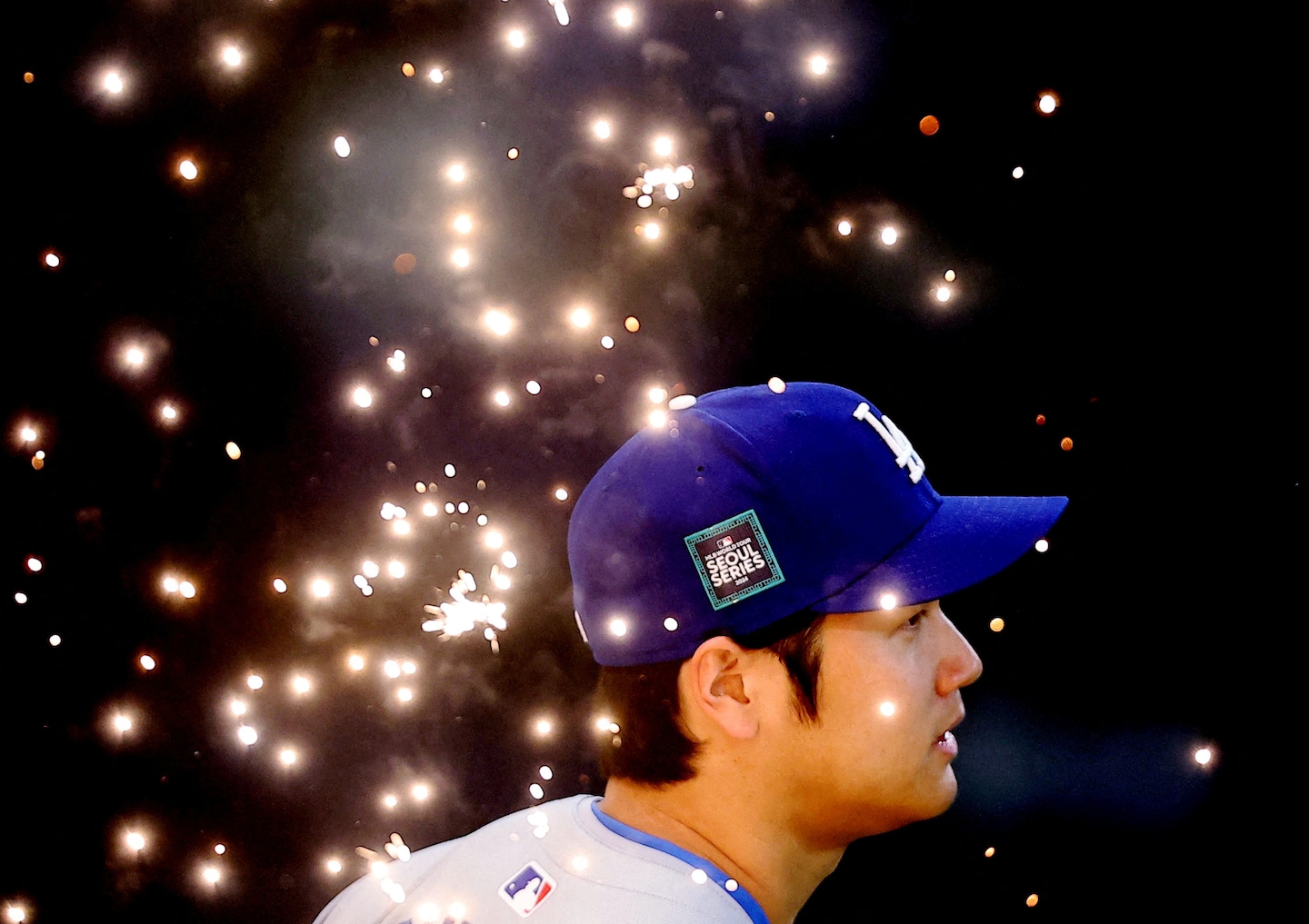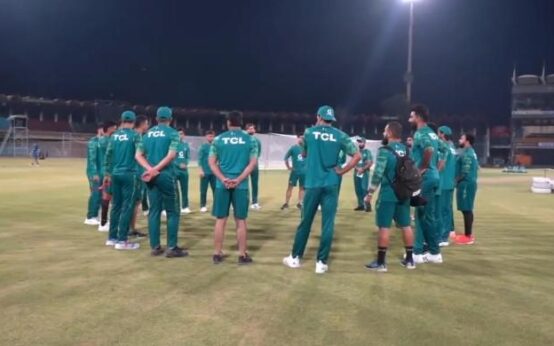Because while Major League Baseball has played season openers abroad before, this one was even more poignant than it was pomp and circumstance, a celebration of Asian baseball unlike any that could have been staged before it. The Dodgers opened their Ohtani era with a 5-2 win over the Padres and the most accomplished Korean player in MLB today. They did so in the first game MLB ever played in South Korea, an event that served as both acknowledgment and confirmation that America’s pastime is starting to become South Korea’s pastime, too. They will play again here tomorrow. They will remember it here for years to come.
Chan Ho Park still remembers how unthinkable a night like this was when he became the first South Korean player to appear in an MLB game. To see it materialize now, 30 years after his major league debut, he told reporters in Korean on Wednesday, seemed like the culmination of his life’s work.
And when he threw out the first pitch before Wednesday night’s game, Park did so with the glove he used when he debuted with the Dodgers in 1994. It had been in a museum because Park is a sentimental collector. He told reporters about growing up in a small town, never having access to major league games on television, dreaming of something he never had the chance to see. Now, Korean kids can watch one of their own, Ha-Seong Kim, not only play in the majors but do it in Korea. And they will see Park as their pioneer.
“I will only be throwing one pitch, but I will feel like I am pitching the whole game. That’s how important this is to me,” Park said through an MLB interpreter. He insisted on answering all questions in Korean, because that is who he wanted to hear him most.
Park and Kim were two of the biggest stars of Wednesday’s show. Ohtani still topped them both. Fans roared every time he stepped to the plate or was shown on the big screen, television broadcasts caught his wife in the stands. This series, like every other in the sport this year, will be played in his shadow.
Japanese athletes have rarely been treasured in South Korea the way Ohtani has been this week. Historical tensions between Japan and South Korea over Japan’s occupation in the first half of the 20th century spilled into a years-long on-field rivalry, one fueled by Ichiro Suzuki’s trash talk ahead of the 2006 World Baseball Classic. The Koreans beat the Japanese that year, and in most international tournaments since, one side or the other has thrown tinder on the fire.
But unlike some of his predecessors, Ohtani was gracious about his time in South Korea in a series-opening news conference. The U.S. ambassador to South Korea sat alongside the Japanese foreign minister and the Japanese ambassador to South Korea on Wednesday night, in a group that included U.S. ambassador to Japan, Rahm Emanuel.
“It goes without saying that on the heels of [the trilateral partnership agreed to by Korea, Japan, and the U.S. last year], sports has always been a really significant piece of diplomacy,” Emanuel said. “You have a Korean player on the Padres, a Japanese player on Dodgers, playing in Seoul the game that we think of as our pastime, but it’s actually all three countries’ pastime now. This sport, these athletes, at these moments, have an outside importance for these countries.”
But after the flags were unfurled and the anthems played, when the K-pop concert was over and the laser light show concluded, there was baseball Wednesday. And the baseball mattered in its own ways, too.
Mathematically, it was one game of 162, barely one percent of a season these teams hope will not end for seven months or so, if all goes well. Historically, it was the beginning of a new era for one of baseball’s most historic franchises: This is the Shohei Ohtani era of the Los Angeles Dodgers, a moment in which they look too good to fail, with three former MVPs at the top of a lineup that should be the most exciting anyone has ever seen.
And it is the beginning of a new chapter for Ohtani, whose former team, the Los Angeles Angels, were always postseason long shots, leaving him to play meaningless baseball by July in every year of his major league career. This year, Ohtani, who signed with the Dodgers in the offseason, will not merely get the chance to win, he will be expected to do so. He went 2 for 5 with an RBI Wednesday, a quiet night by his gargantuan standards.
The Padres, too, began a new phase in their life as an annual contender. Their owner, Peter Seidler, passed away in November. Those left to run the organization in his stead thought it best to cut payroll after years of spending more than any team of comparable market size. Their manager, Bob Melvin, departed after months of disconnect with General Manager A.J. Preller and grumblings about an uncomfortable clubhouse atmosphere. They replaced him with affable veteran Mike Shildt, traded star outfielder Juan Soto to the New York Yankees, and shed the massive expectations that free spending always brings.
And so, as all that meaning and all those narratives collided in Gocheok Skydome in Seoul on Wednesday evening, baseball did what it tends to do, and provided a reminder of just how rarely this game indulges dreams of grandeur: Veteran ace Yu Darvish walked Mookie Betts on a pitch clock violation. The 2024 season was underway. Next up was Ohtani, who had never faced Darvish in the big leagues, setting up a clash of Japanese baseball titans. Ohtani grounded into a force out, and this new era had begun.
Ohtani’s first hit as a Dodger, a line drive to right field, came in his next matchup with Darvish. The first run of the regular season came a half inning later, when Ohtani’s former Angels teammate, Tyler Wade, scored for the Padres on Xander Bogaert’s bloop hit. The Dodgers tied the game on a sacrifice fly. The Padres took it back with an RBI double play. The Dodgers tied it again with another sacrifice fly. No fireworks. No superhuman homers. Just baseball.
And when the Dodgers finally took the lead in the top of the eighth inning, they did so because a surefire double play ball broke straight through the webbing on Padres first baseman Jake Cronenworth’s glove with two men on, allowing Teoscar Hernández to score. Cronenworth replaced the porous glove after that, but the Dodgers had already broken through. Betts singled home a run. So did Ohtani. The damage was done.
“Felt pretty confident that was a 3-6-1 [double play],” Shildt said. “But the ball went through his webbing, and you know, the rest is history.”
Here, the history made Wednesday night was much bigger than that written by a faulty glove and a bouncing ball. But that play will linger in memories, too, if only because it was so unusual and unexpected. Perhaps that is fitting somehow, a testament to the game this country has grown to love. After all, what is the MLB regular season if not six months of nights defined by minutia, slowly but surely accumulating meaning — a game so strange that somehow, someday, that glove that broke might belong in a museum here, too.


 Best Underground Water Leak Detection Equipment 2024
Best Underground Water Leak Detection Equipment 2024  Best Backyard Ideas: Turn Your Outdoor Area Into a Creative and Calm Haven
Best Backyard Ideas: Turn Your Outdoor Area Into a Creative and Calm Haven  Babar, Rizwan are good players but not whole team, says Mohammad Hafeez
Babar, Rizwan are good players but not whole team, says Mohammad Hafeez  Pak vs NZ: Green Shirts aim to bounce back against Kiwis today
Pak vs NZ: Green Shirts aim to bounce back against Kiwis today